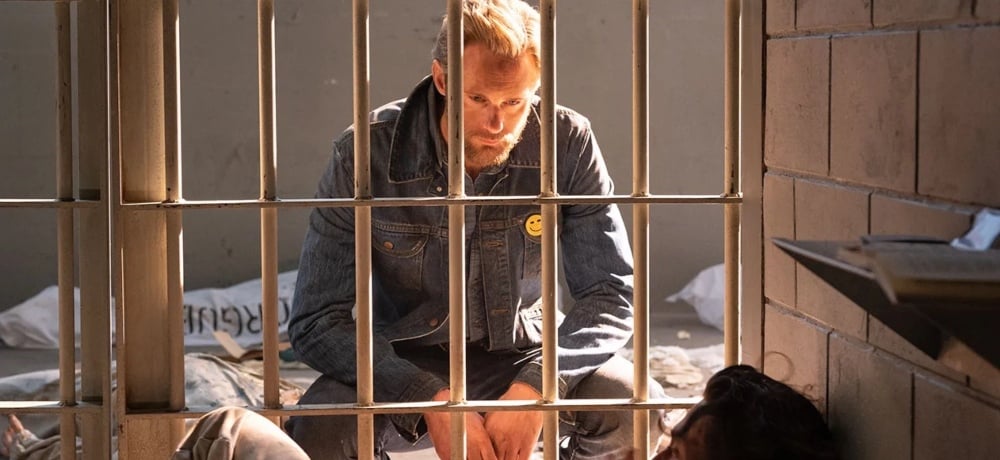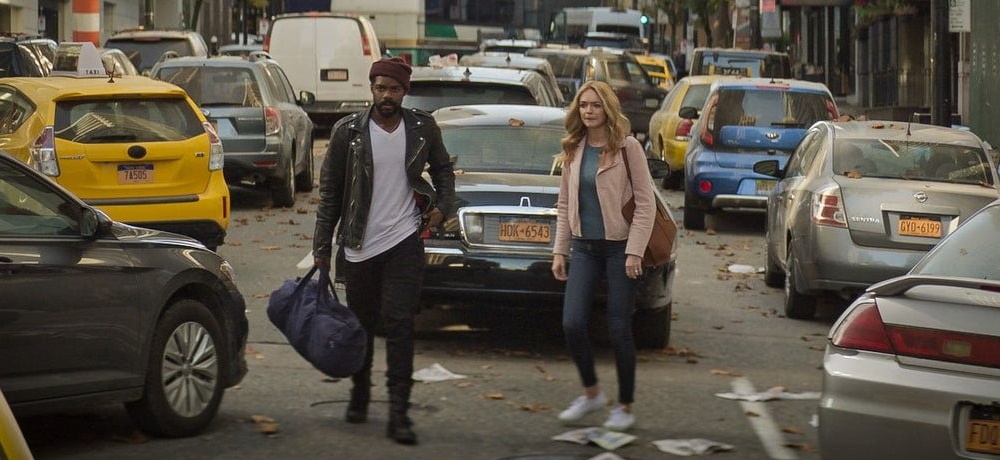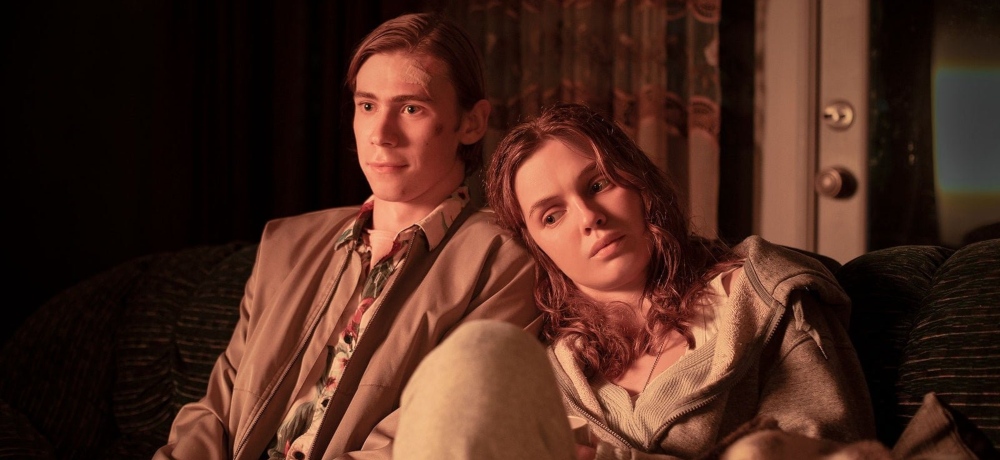






As someone whose favorite work from Stephen King is The Stand, to say that I’ve been excited about CBS All Access’ new series based on the epic book would be a huge understatement. What’s interesting to me is that, while this is a story that’s inherently about good versus evil, it’s always been more than that to me. Personally, I feel like what has always made The Stand so riveting every time I revisit it is that it’s a story about the commonality of the human existence, and how stripping us down to the point where all that’s left is just our humanity is an act that can bring out the best—and in some instances, the worst—in all of us. I’m not someone who would consider themselves a religious person, and despite the fact that the world can be an ugly place, it’s The Stand that has always fueled my sense of optimism, and made me realize that ultimately, it’s hope that will always be a far more powerful force than fear.
In any case, the fact that we have a new version of The Stand being released in 2020 is something of a weird feeling, but I was still anxious to revisit this story and these characters all the same. And these are my thoughts from the first four episodes from CBS All Access’ limited series.
This premiere episode opens with a voiceover from Mother Abigail (played by Whoopi Goldberg, who was initially supposed to play the character in Mick Garris’ 1994 miniseries) as we watch a group of survivors enter a church filled with decaying corpses, which immediately signals to me that the series is going to go back and forth between the rebuilding of society that happens after everyone dies and a series of flashbacks as we meet the survivors and get to know them better. While I understand the decision to go this route (it worked well for series like Lost and The Walking Dead), I think part of what made it hard for me, someone who has spent decades with these characters, to settle into this framework is that we’re not given much to help us invest in the survivors emotionally. If you’re like me and you re-read the book frequently (or revisit Garris’ aforementioned miniseries often), it’s probably easier to identify the characters as we cross paths with them, and there were moments when I genuinely geeked out at the appearances of several characters. But I would imagine if you’re coming into The Stand as a newcomer, there’s going to be something of a disconnect because there are several instances of scenes picking up with a new character and they’re never really introduced to us as viewers.
But as I mentioned, I was thrilled to get to see new versions of these timeless (to me) characters, and so far, the real standouts are James Marsden as Stu Redman, Brad William Henke as Tom Cullen, Owen Teague as Harold Lauder (more on that later), Alexander Skarsgård, who has been a pretty solid Randall Flagg so far (but I’m really looking forward to see how far the character will go in later episodes), and I think Odessa Young as Frannie Goldsmith is doing the best with the material she’s been given. Ultimately, the way her character is written here is somewhat lifeless—even emotionless—at times, but it’s still an engaging performance all the same, and I’m hoping maybe we get to see more from Young later on as The Stand’s story builds to its conclusion.

Also, when it comes to the pandemic itself that acts as the catalyst for the events of The Stand, there is a sense of scope that feels like it’s missing, at least from these episodes in particular. As this series embarks on its nine-episode run, it really should be setting the stage for the enormity and the high stakes that are at play in King’s novel, but we don’t really get much of that yet. The storytelling here feels more contained, where we get these little glimpses of horror as we watch humanity implode, instead of this nation-sweeping plague that is claiming nearly every living being in its path. There’s a lot of chaos during the flashbacks of when “Captain Trips” begins to wreak its havoc, which we really get a sense of during a scene involving Larry Underwood (Jovan Adepo) retrieving his ailing mother from an over-encumbered hospital (eerie imagery to behold right now, for sure), but that’s really it so far. And the sense of dread that King filled all those pages of his novel with isn’t present in these four episodes, either. The structure and the pacing almost feel a bit “business as usual,” which I’m not sure is a result of other similar pandemic/apocalyptic-themed popular entertainment that has been released over the last few decades, or the fact that we’re pretty much living through a pandemic ourselves currently.
Another intriguing decision made by this iteration of The Stand in these initial episodes is to frame a lot of the story around Harold Lauder, incel extraordinaire and all-around terrible guy. This is something I struggle with because on one hand, Teague is absolutely PHENOMENAL in the role (most folks will recognize him from his role as Patrick Hockstetter in 2017’s IT), and even though the series at this point skips over all the sad sack stuff about Harold that might make him somewhat redeemable, Teague does add some great dimension to the character with his chilling portrayal of a disturbed young man who seems to be content eating Baby Ruth bars, emulating Tom Cruise’s empty sense of charisma, and planning to kill off as many people he can in “The Free Zone”—the community in Colorado that has been built up around Mother Abigail. I do think Teague’s performance is a real highlight of the series thus far, and I hope this leads to more work for him in the future.
The only drawback to focusing so much time on Harold is that when you’re doing a story like The Stand, where you have a ton of integral and engaging characters, putting so much focus on one character specifically can take away from others who don’t feel nearly as fully realized. That being said, there might be some value to centering a great deal of your narrative around a character like Harold, especially in the present day, when we see so many of his values reflected in certain subsets of society, so it’s hard to fault the writers for going this route. In any case, I’ll wait and see to hold final judgment over just how much Harold we’ve been getting until I can see how everything shakes out later on in the season.

There are some changes to King’s material in this version of The Stand, too. Some of them are a little spoilery, so I won’t get into too many of those, because I want to preserve those surprises for other viewers. But I do think they make sense with how this series reframes King’s story. What I can say is that one of the biggest changes was how this virus manifests itself physically in victims. The imagery of these people choking to death is gruesome and haunting, especially when coupled with the physical transformation that victims undergo (which made me gasp aloud the first time I saw it). This change seems to be rooted in an extreme version of goiter—at least that’s how it looks, and I think the decision to change that up really works in favor of a visual medium because that imagery really packs a punch.
As far as everything I’ve seen up until this point in The Stand series goes, I remain cautiously optimistic as someone who is a big fan of the book. Even though I have some reservations about how aspects of this adaptation were handled from a storytelling perspective, that doesn’t mean I’m still not 100 percent in for this iteration of The Stand as I’m really curious to see just how it all comes together once we get to that concluding ninth episode in February. I think longtime fans of the book version of The Stand should definitely give it a watch, just because I think there’s a lot to unpack and discuss, and half the “fun” of the show is going through all the nerdy aspects of the series that fans will undoubtedly glom onto (and there are some Kingiverse nods to other works from the acclaimed author peppered in the series for good measure, too).
For those unfamiliar with The Stand, this new series might be something of a gamble with your time, as I think the structure and approach assumes its audience has a certain amount of knowledge about these characters and the events of the book. But there is an eerie timeliness to the story of The Stand, and those core themes about humanity and believing in what’s good in this world still make it an engaging watch all the same.
[Photo Credit: Above photos courtesy of Robert Falconer/CBS.]